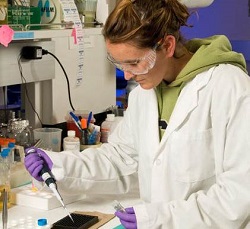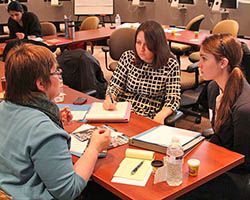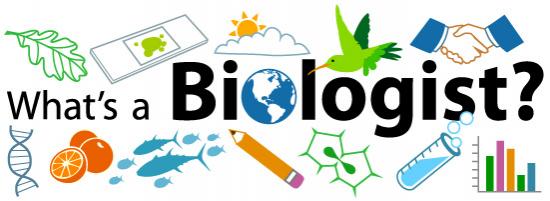show/hide words to know
How Do You Become a Biologist?

Most biologists go to college to earn a degree. Image by Tulane PR.
Biologists come from diverse backgrounds. Some are rich and some are poor, some do well in school but others don't, they come from every country in the world, and they span all different ages. The thing they all have in common though is the curiosity to learn about life.
Many young scientists begin studying to become a biologist during science classes in middle and high school. This is where students start to really learn about the basics of science.
But what if you don't do well in school? Or what if you're stuck in a different job already? As biologist David Hughes explains, as long as you have an interest in discovering things, you can still become a biologist:
or download the mp3 here.
Opportunities in middle and high school, such as volunteer positions, internships, or science fair projects, can help you 'get your feet wet' in an area of biology that you might be interested in. There are also online resources to help you to move forward and make decisions no matter where you are in your journey to become a biologist. Check out our Career Tips page for information about these opportunities and resources.
Going to College to Become a Biologist
Many people who decide to become a biologist decide to go to college to obtain a degree in biology. If you decide to go to college, you will have another opportunity to study biology. Undergraduate biology programs at different universities offer courses that help prepare a person for a career as a biologist. They often involve reading information from online resources and textbooks to help understand the basics of biology. These basics may include topics such as:
| • Genetics | The study of genes, heredity, and variation in organisms. | |
| • Evolution | The study of inherited characteristics of a living thing over time. | |
| • Physiology | The study of how living things function or work. |

Getting research experience is a valuable part of hands-on learning in biology. Image by US EPA.
Most jobs in biology do require that you have a college degree. Undergraduate biology programs also provide an important opportunity to do research (such as in the SOLUR program at ASU, for example). Research often allows a person to study a specific part of the biology world in more detail.
Research experience can help a student learn to think like a biologist, applying knowledge to ask questions and uncover new information. This is where students "get their hands dirty" doing science.
After a student graduates with a biology degree, there are many different careers that she or he can pursue.
Some biologists will look for work outside of the university setting. Visit our Beyond the University page to learn more about these other career options.
Additional Degrees That Can Help You in Biology:
Biologists may also continue their studies in the university setting to obtain a graduate degree.
| • Master's Degree |
A master of biology might continue working in a lab as a manager. She or he would help to coordinate the work that other biologists may be doing. |
|||
| • Ph.D. Degree |
A doctor of biology may run her or his own biology lab. Her or his job would be to teach college-level courses and continue performing experiments, but as the head of the lab. |
Check out the Returning to University page to learn more about Master's and Ph.D. Degree programs.
Popular Career Areas for Biologists:
Whether a student decides to pursue a graduate degree or begin working after graduating from college, there are many career options available.
| • Government | Work with agencies like the United States Department of Agriculture or the Food and Drug Administration. |
| • Non-governmental organization | Help the government make new regulations by working with other scientists and the public. |
| • Industry | Develop new products that people use in daily life, like food and medicine. |
| • Teaching | Work at a grade school or middle school as a science teacher. |
| • Medical Profession | Continue training to work in a health field, like doctors and nurses. |

Collaboration is an important part of research. Image by Knight Foundation.
While these different biology careers are all unique, they are also similar. For example, whether a person continues her or his schooling or decides to work in industry, she or he will focus on a specific part of biology. Many biologists also work together with other people, including other biologists or scientists, to solve bigger issues.
Remember that there are many ways you can use an education in biology.
See a more extensive list of biology careers on our Careers A to Z page.
Additional images via Wikimedia Commons. Image of Antarctica by Andrew Mandemaker.
View Citation

Where in the world will biology take you? Check out some of the specific career options biology has to offer.
Be Part of
Ask A Biologist
By volunteering, or simply sending us feedback on the site. Scientists, teachers, writers, illustrators, and translators are all important to the program. If you are interested in helping with the website we have a Volunteers page to get the process started.
Discover exciting careers in science and beyond by exploring fun virtual Worktours(link is external) of real companies.







